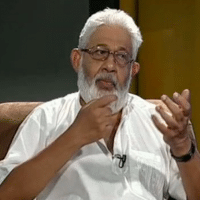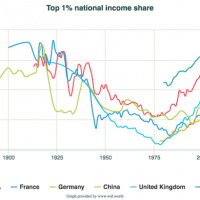-
Craig Murray: Detente bad–Cold War good
Political memories are short, but just 15 years after Iraq was destroyed and the chain reaction sent most of the Arab world back to the dark ages, it is now “treason” to question the word of the Western intelligence agencies, which deliberately and knowingly produced a fabric of lies on Iraqi WMD to justify that destruction.
-
Race, gender and social reproduction in British capitalism, 1945-78
How can we understand the way that capitalism comes to be gendered and racialised?
-
On Marx and Epicurus
Given the fragments, literally, of the works of Epicurus available to Marx at the time, the materialist analysis that he manages to develop from them is pretty amazing.
-
Confronting Cinema’s Fascist Unconscious with Maxximilian Seijo
In this episode, Money on the Left cohost Maxximilian Seijo (@maxseijo) expands upon the argument made in his video essay, “Inglorious Basterds: Nazi Desire Fully Employed,” which takes a neochartalist lens to Quentin Tarantino’s Inglorious Basterds (2008).
-
Mental illness and the psychological trap – a political problem
Mental illness is a serious problem, reaching epidemic status, and the problem is increasing rapidly amongst young people not only in South Africa but globally. There is a tendency in society to either: (1) disregard mental illness as a serious problem, or (2) to recognise mental illness as a problem but fail to treat the underlying causes that result in mental illness.
-
How can the resistance of the Venezuelan people and Nicolás Maduro’s government be explained?
Despite economic war, sabotage, low oil prices, international sanctions, and political violence, the Venezuelan people are still standing and supporting the leaders of the Bolivarian Revolution.
-
The surprising popularity of ‘far Left’ policies
“The Far Left Is Winning the Democratic Civil War” was the headline over a Washington Post report (5/16/18) on the results of recent primary elections.
-
Jill Stein breaks the silence on being a Russiagate target
Former Green Party presidential candidate Jill Stein has turned in her campaign materials to the Senate Intelligence Committee, and warns that Russiagate is being used to silent dissent.
-
Is Marxism science? Part 1: Darwin, Marx and the scientific method
Ringa Ranga Rajah, a London devotee of recently departed Ambalavanar Siva, complained bitterly last year when 14 March went by and I neglected Marx and Einstein. The former died on 14 March 1883 and the latter was born on 14 March 1879. I promised to make amends and this year Sundays 11 and 18 straddle the date.
-
Utopia and inequality
Economic inequality is arguably the crucial issue facing contemporary capitalism—especially in the United States but also across the entire world economy.
-
NYT joins campaign to purge the term, “white monopoly capital” in South Africa
The New York Times, the world’s premier journalistic purveyor of a “fake,” imperial, and profoundly white capitalist world view — masquerading as all the news that’s fit to print — wants us to believe that a now-bankrupt London-based public relations firm is behind South Africa’s regime-shaking debate over the rule of “white monopoly capital.”
-
U.S. and Argentina threaten to ban Venezuelan oil
U.S. Secretary of State Rex Tillerson is threatening to ban the import and export of oil and crude products from Venezuela into the U.S. to pressure President Nicolas Maduro to “return to the constitution.”
-
Istvan Meszaros and Marx’s theory of alienation
The late Hungarian philosopher explained how alienation can only be overcome by collective action which challenges capitalist relations of production.
-
Between Como and confinement: Gramsci’s early Leninism
In May 1924, near the small town of Como, close to the border of Italy and Switzerland, the two great figures of early Italian communism faced each other at a meeting of the Parti Communista d’Italia (PCI) leadership.
-
Obituary: István Mészáros, hungarian Marxist political philosopher who taught at St Andrews
István Mészáros, Marxist political philosopher. Born: Budapest on 19 December 1930. Died: Kent on 1 October 2017.
-
Venezuelan company lets 55 tons of flour rot
The company received more than US$85 million in government subsidies in 2015 for the production and distribution of food at fair prices.
-
DIY politics in the UK
‘If it ain’t broke, don’t fix it,’ goes the old adage; well it is broke. Over the past two years it has become, for many, overwhelmingly obvious that the mainstream media in the United Kingdom is broke.
-
Understanding the native roots of the constitutions of Bolivia and Ecuador
Good Living is a philosophy promoted by Andean governments of South America, pioneered by Evo Morales (Bolivia) and Rafael Correa (Ecuador). It goes back to the roots of ancestral cultures of the region and posits a model for human life in harmony with nature.
-
The feminism of Anja Meulenbelt
Trump did us all an enormous favor. His election was such a shock that millions of people went into the street. And to see women in the lead meant a great deal to me as a feminist.
-
Rhetoric, fascism and the planetary
The neoliberal right has succeeded in pushing concentrations of wealth and income to an ever smaller group of tycoons at the top, while the pluralizing Left…has had precarious (and highly variable) success in its efforts to advance the standing of African Americans, Hispanics, women, diverse sexualities, and several religious faiths.… One minority placed in a bind between these two opposing drives…has been the white working and lower middle class. Portions of it have taken revenge for this neglect…. That has created happy hunting grounds for a new kind of neo-fascist movement, one that would extend white triumphalism, intimidate the media, attack Muslims, Mexicans, and independent women, perfect the use of Big Lies, suppress minority voting, allow refugee pressures to grow as the effects of the Anthropocene accelerate, sacrifice diplomacy to dangerous military excursions, and displace science and the professoriate as independent centers of knowledge and pubic authority.




















